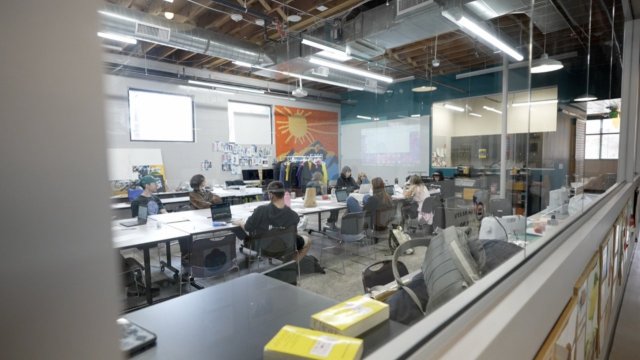Taking notes and doing research are typical in a classroom. However, what's unique about this high school goes beyond the education.
"You shouldn't have to drop out of school just to get away from drugs and just to be able to get clean and sober," said Melissa Mouton, the Executive Director of 5280 High School.
5280 is a recovery high school in Denver, Colorado. Mouton tells Scripps News it's one of the fewer than 50 schools in the country focused on supporting personal lives, mental health, and substance use issues, as well as education.
"Treatment is cheaper at a younger age. You avoid juvenile justice costs and incarceration costs by the millions," Mouton said. "We are avoiding homelessness; we're avoiding public assistance; we're avoiding joblessness, unemployment."
She and the director of recovery, Keith Hayes, explain that so often, children are left out of the conversation about addiction.
"This is not just an adult disease," he said. "It affects our children. And because we're in the worst drug crisis our country has ever seen, kids are getting addicted younger and younger."
Drug overdoses are the leading cause of death for Americans under the age of 50. Six percent of 12th graders use marijuana every day, and up to 30% of high schoolers use alcohol and binge drink. But kids, like Carmine Urbina, aren't just statistics.
SEE MORE: Father helps students' addiction recovery after daughter's death
"I started doing LSD, mushrooms — I was drinking heavily. Like every day, two bottles of anything I could get my hands on," said Carmine, who is a junior at 5280 High School.
He got high for the first time before he was 12 years old. He grew up moving frequently across the state of Colorado with a mother who was affected by addiction herself.
"She did heroin, fentanyl — anything you could think of, she did it," Carmine said.
He and his siblings went through foster care and eventually got adopted.
"I will always remember the first time that I saw them at their auntie and uncle's front yard. Beautiful kids," said Mary Beth Taylor, Carmine's adoptive mother.
It was his adoptive parents, Steve Cummins and Mary Beth Taylor, who watched Carmine struggle through the pain.
"The only time he's civil is when he is high, and, usually, he is not even communicating," Cummins said.
"He'd pretty much get drunk at school, and then he'd sober up by the time I'd pick him up," Taylor said.
While they say seeking help was a bumpy path, it eventually led them to 5280.
"He's got these skills that he didn't have a year ago," Cummins said. "He can advocate for himself, communicate well; He's learning to be a responsible adult, while still being a very fun kid."
"I never thought I could be loved by a random person, or my parents, because of stuff in my past. But now, I understand it. Everyone here has got love for each other," Carmine said.
SEE MORE: Youth's overdose death renews pleas for Narcan in schools
Recovery is about more than getting sober. And that's why 5280 partners with Full Circle, which is a 12-step-based recovery community organization.
"All the meetings are very solution-focused. And the idea is that the whole program is peer-to-peer, so it's young people talking to young people as well as parents talking to parents," said Ben Stincer, the program director in Denver.
They have programs in different parts of the country and are working to expand further. Stincer watches these teens attend support group meetings and sober social events, where they learn to be kids again.
"If they can have that smooth transition from the 3 p.m. get out of school to come over to Full Circle and hang out, it provides them with a seamless transfer of A. trust but B. accountability," Stincer said.
Only one in five of the 2.4 million people who suffer from opioid substance disorders receives evidence-based treatment. It's one statistic these experts say could change if more programs like this existed.
"Let's take what we do and apply it to more communities," Mouton said.
"School is a phenomenal mechanism for recovery because we get to spend years with the kids," Hayes added.
Unlike many of the recovery schools across the country, 5280 is a charter school that has free tuition for all students. Money from the state, along with fundraising efforts, allows the school to operate. School administrators say every state has its own unique challenges, but that it's certainly possible to replicate this model across the country.
Trending stories at Scrippsnews.com




